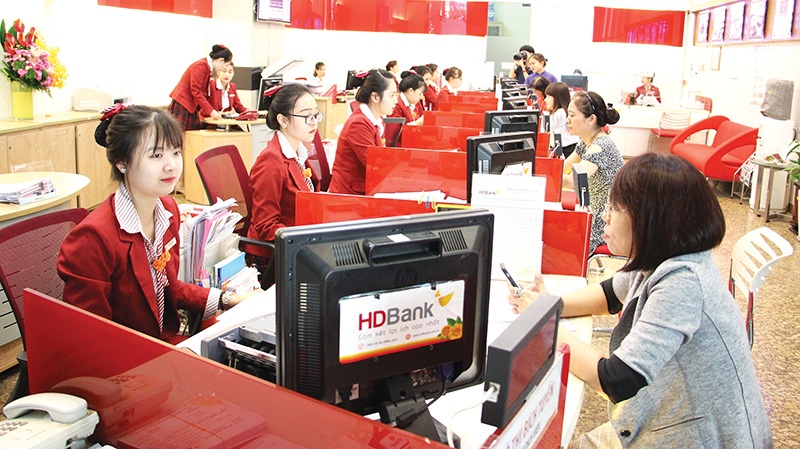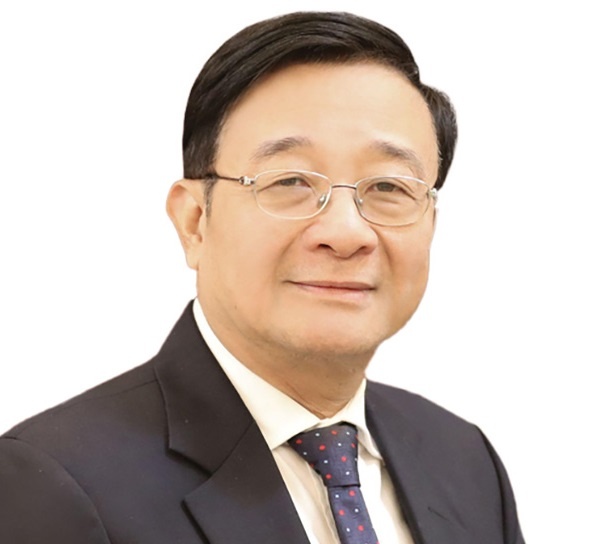Banks reach for the stars with tie-ups
 |
| Among privately-owned commercial banks, the overseas ownership rate has reached 27-28 per cent |
Considering the EU-Vietnam Free Trade Agreement, authorities are pondering a loosening of rules that have previously impeded bank mergers, such as boosting the foreign ownership limit (FOL) ratio for two local banks to 49 per cent as stipulated by the agreement.
The four state-owned banks – Vietcombank, VietinBank, Agribank, and BIDV – would, however, not be engaged in the FOL shift.
In a new study, Mirae Asset Securities stated that HDBank is one of two privately-held banks approved to have the FOL relaxed. If the necessary modifications are made, HDBank’s stock may be more appealing to long-term investors. “HDBank’s inclusion as one of the candidates whose FOL may be extended up to 49 per cent to comply with the EVTFA would be a key stimulus for the bank,” the brokerage said.
VPBank, on the other hand, published a notice soliciting shareholder feedback on increasing the maximum FOL ratio a fortnight ago. The maximum FOL may be raised from 15 to 17.55 per cent of the bank’s authorised capital.
VPBank’s chairman of the board of management, Ngo Chi Dung, said that the bank aspires to provide private placement to a strategic partner, and expected this plan to be completed in Q1/2022. If the bank is successful, its equity might reach a record high of more than $5.22 billion.
VPBank is one of the few large local banks that have not yet partnered with strategic overseas investors. Japan’s SMBC is rumoured to be a prospective foreign strategic partner for VPBank, especially in light of the extraordinary transaction with FE Credit.
Nguyen Thanh Tung, deputy general director in charge of state-owned lender Vietcombank’s executive board, revealed in the bank’s year-end meeting that a concrete plan should be in place to remove Vietcombank’s FOL percentage, which is projected to increase to 35 per cent shortly.
Viet Dragon Capital Securities (VDCS) predicted that Vietcombank’s proposal for a rise in its foreign cap and capital expansion through private placement has not seen significant progress up to date. However, if Vietcombank is permitted to raise capital through a private placement mechanism, this would serve as an extra incentive for the bank’s operation.
Comprehensive overhaul
According to OCB’s executives, the bank is now in negotiations with international partners to sell the remaining foreign room, effectively shutting the cap below the legislation’s threshold of 30 per cent. At the moment, Japan’s Aozora Bank is the largest foreign shareholder of OCB, owning a 15-per-cent stake in the Vietnamese bank from a deal of around $139 million.
This is also Aozora’s first offshore transaction since 2001. The two sides have collaborated on digital banking and investment services, as well as on assisting Japanese businesses expanding into Vietnam.
“After executing the comprehensive reorganisation in 2022, Sacombank plans to sell 32.5 per cent of its stake to two international investors,” shared Duong Cong Minh, chairman of Sacombank.
Minh further said that the sale of shares to foreign partners must be authorised by the government and Vietnam Asset Management Company (VAMC). A special mechanism to purchase back 32.5 per cent of VAMC’s share in Sacombank’s ownership is now being implemented, Minh added.
In the case of Viet Capital Bank, the board of directors believes that prospective investors should share the same business ambitions for businesses and retail banking, as well as the rapidly expanding digital banking landscape in Vietnam now.
“In recent years, Viet Capital Bank has cemented a corporate culture of agility and product localisation to better serve different customer segments or subsegments. It is time for us to leverage this strong culture to enhance our competitive capability and expand the bank’s business scale. Therefore, the bank also expects investors to be agreeable to this course,” a representative from Viet Capital Bank told VIR.
“Since we are now undergoing a comprehensive digital transformation, it will be a fantastic privilege to team up with investors that are both financially sound and capable of bringing in strategic assistance along the way. We are willing to initiate discussions with potential institutional investors who understand and share the same vision of Vietnam’s burgeoning banking landscape,” the bank’s representative added.
Pham Van Thinh, general director of Deloitte Vietnam, noted that when the pandemic has been brought under control, mergers and acquisitions transactions in the finance and banking sector will be resumed.
“The industry is nevertheless appealing to international investors in the long run, despite the banks’ increasing risk of bad debts, since their business outcomes remain positive,” he said.
Foreign investors’ discretion
According to figures from 2021, some foreign investors in commercial banks would exceed the 30 per cent cap, while others would fall well short of it.
In the remarks of Can Van Luc, chief economist at BIDV, international financial institutions have entered Vietnam’s market at an early stage of development.
“At the moment, Vietnam boats nine foreign banks, two joint-venture banks, and several other financial organisations that have made contributions to the country. In contrast, throughout the previous decade, the overall market share of foreign-owned and joint-venture banks in Vietnam has been estimated to be approximately 10 per cent, far less than their local counterparts.”
Global investors have been hesitant to engage in Vietnam’s banking landscape in the long run, despite the country’s vast prospects. Some foreign lenders have also offloaded their shares in Vietnam’s retail banking sector.
Last April, global banking behemoth Citigroup withdrew its consumer franchise in 13 markets, including Vietnam. In mid-January, Citigroup agreed to divest its consumer business in Vietnam, Thailand, Indonesia, and Malaysia to Singapore-headquartered UOB for $3.7 billion. The sale brings the US bank one step closer to its objective of specialising in institutional clients.
UOB is currently Southeast Asia’s third-largest bank. By acquiring Citi’s unsecured and secured lending portfolios, wealth management, and retail deposit businesses in the four nations, UOB signals its eagerness to expand its business outside of Singapore like its other counterparts.
The retail banking business of Citi was also considered by other local banks in Southeast Asia, but UOB was able to seal the deal after agreeing to purchase all four units, market watchdogs revealed.
Ramachandran A.S., Vietnam Citi country officer, emphasised, “This is a very positive outcome for our clients, our colleagues, and Citi. We have been serving our corporate and institutional clients with distinction for the last 28 years in Vietnam. We shall continue to do so, executing our renewed strategy and assisting Vietnam’s rapid economic growth.”
On the other hand, the foreign investor space in commercial banks remains mostly unfilled. Vietcombank, VietinBank, and BIDV all have foreign holdings of 16.7-25.5 per cent, while Agribank is working towards its equitisation.
Thus, the average remaining room for these four banks is approximately 13 per cent.
Among privately-owned commercial banks, the proportion of overseas financiers’ ownership has reached 27-28 per cent, and some banks are actively searching for greater foreign involvement.
“An appropriate strategic partner is difficult to find, though. In the meantime, investors have lost out on opportunities since the evaluation and approval processes take ages. The domestic legal framework is too contradictory to be followed up on,” added Luc from BIDV.
| Nguyen Quoc Hung - General secretary Vietnam Banking Association
By capping the FOL at 30 per cent, Vietnam’s banks may lose growth opportunities due to a lack of capital, while deep-pocketed overseas financiers are critical to the process of banks’ innovation and Basel implementations. Strategic investors are often concerned about their partners’ financial health and managerial ability following international standards. In addition to strengthening risk management capabilities, technological innovation, and dealing with soured loans, the legislative framework should be modified to align with global norms for long-term stability and consistency. It is thus vital to open a larger space to attract foreign engagement in this sector, which is critical for economic growth and the expansion of commercial banks’ financial capacity and competitiveness, as well as speeding up bad debt settlement. |
What the stars mean:
★ Poor ★ ★ Promising ★★★ Good ★★★★ Very good ★★★★★ Exceptional
Related Contents
Latest News
More News
- Private capital funds as cornerstone of IFC plans (February 20, 2026 | 14:38)
- Priorities for building credibility and momentum within Vietnamese IFCs (February 20, 2026 | 14:29)
- How Hong Kong can bridge critical financial centre gaps (February 20, 2026 | 14:22)
- All global experiences useful for Vietnam’s international financial hub (February 20, 2026 | 14:16)
- Raised ties reaffirm strategic trust (February 20, 2026 | 14:06)
- Sustained growth can translate into income gains (February 19, 2026 | 18:55)
- The vision to maintain a stable monetary policy (February 19, 2026 | 08:50)
- Banking sector faces data governance hurdles in AI transition (February 19, 2026 | 08:00)
- AI leading to shift in banking roles (February 18, 2026 | 19:54)
- Digital banking enters season of transformation (February 16, 2026 | 09:00)


 Tag:
Tag:




















 Mobile Version
Mobile Version